
Colin Spacetwinks posts a lot online, and is mostly known for the posting, and that's a vector for some kind of success nowadays I guess. They also self-publish essays, stories, and games written in twine, as well as occasionally writing for places like the VRV blog about things like classic 70s horror manga featuring children in a hell storm of an apocalypse, or giant robot anime that's actually mostly about civic service and bureaucracy, or writing about a Kairosoft horse raising simulator for Capsule Crit.
First up: Apologies to anyone who thought I might have learned reasonable restraint in writing a top 10 list since last time.
Secondly: hahahaha you thought i’d learn how to shut the fuck up or be concise, lmaoooo.
Thirdly: oh god i’m so sorry this is going to be so long. oh god it’s so fucking long. why can’t i stop talking. please take breaks while reading this.
Anyway, real talk. 2018, like 2017 before it, has been kind of a nightmare. We get through it how we can. Video games can be part of how we get through it. Sometimes that’s through escapism, sometimes that’s through unique de-stressing/anti-anxiety methods, sometimes that’s actually through directly confronting said nightmare and finding ways to better understand it, and our relation to it, and what we can do about it. 2018 provided all of these to me, even if some of them (most of them?) aren’t actually games that came out this year.
Not ranking only games that came out in 2018 for my GOTY 2018 list is another way i have not changed from last year.
But regardless, there’s a lot to talk about, and to share--and I hope I share some games, or some thoughts on those games, that you might have not come across before. I am, after all, sometimes a painfully earnest person. Letting you know how I sincerely feel about some of my favorite games this year feels only natural.
But I do want to get something out of the way first. There was a particular thing in games that made me quite unhappy this year, close to the heart. So:
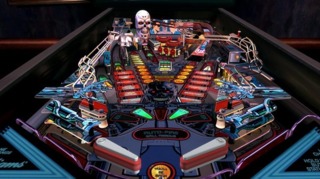
"Fuck this" of the year: Pinball Arcade loses the license to Williams-Bally tables.
Ahhhh fuck dammit c'mon.
Godddddd that was so many tables, and it means they can't get any more Williams-Bally tables either.
Fuck.
Super hyper "Fuck this" of the year: Pinball FX gets the license to Williams-Bally tables.
Oh god dammit fuck this, fucking hell.
Shit ass fuck.
Their physics are weird floaty shit and they still felt obligated to slap all their crappy 3D nonsense all over them.
Fuckkkkkkk.
God, I can’t fucking stand Pinball FX.
Balls.
Okay! Now that I’ve got that out of my system, let's talk about what I actually liked this year!
10. Yoku’s Island Express
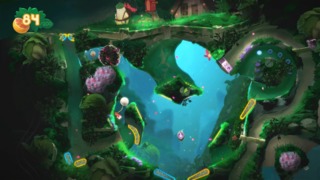
As seen above, I'm a sucker for pinball, taking it (almost) anywhere I can get it. Yoku's Island Express doesn't fulfill the kinda "pure" pinball experience I might be looking for, since nothing in it has the complexity of a real table, but what it does instead is take those basic ideas from pinball and make it into a wonderful little platformer.
There's nothing too grand to say about Yoku's, but it's just plain goddamn fun. It's cute. It's adorable, really. Moving around this dung beetle and his pinball to fill up a fruit wallet or help launch a rocket ship into space, it's just so damn pleasant to watch and play. It's hard to go in-depth on this kind of game the way I usually would go for so many, but it just feels good, it looks good, it plays good, it eases me out with soft, relaxed music, letting me take it easy after a hard day by letting me play as a cute bug that I'm propelling around with pinball flippers and launchers found all over this island I'm delivering hundreds of pounds of mail to.
Sometimes a game's just nice and that's all you really have to feel about it to enjoy the hell out of it.
9. Rxcovery
"Colin, didn't you have an L.O.V.E. Games game on your list last year?"
Yup.
"Could it be that you are biased here?"
Oh yeah.

Rxcovery is a short game... that you almost certainly are going to have to play multiple times, notwithstanding some miraculous mastery of the systems, or just plain cheating. It creates a sense of progress, that way, forcing you to play over and over again to boost your starting point enough that you can actually get through the game in the 30 minute time limit it presents, but it also creates an eerie tension. That you're struggling and struggling and going nowhere, not really making any progress despite whatever other signs of progress you might be making.
This is in no small part thanks to the fact that the entire reason you're fighting and leveling up and collecting money is that you're trying to collect enough dream money that you can convert to real money and pay off your monstrous health insurance costs in the span of 30 minutes so you don't die in real life.
Rxcovery takes heavy inspiration from the Romancing SaGa RPGs, with a vast cast of people you can recruit to help you in your mission to Not Die from Being Unable To Afford Your Health Insurance--so many that it's almost certain you'll miss a chunk of them, even if you play the game several times. And with the time limit system, it takes out the JRPG desire to just grind, grind, grind until you can possibly push through the next boss. There's no time to waste looking to farm enemies or try to find every hidden secret, you gotta keep pushing from room to room, grabbing as much money as you can, recruiting whoever you can, with an ever increasing anxiety that you won't make it in time, that you won't get enough money to pay off the debts already being saddled on you just for needing medical attention at all. It throws the JRPG formula into a turbo mode, creating a wildly different experience for it, even though you can always just play it again after losing, and get a little farther. The stress of trying to make it in time doesn't fade away all that much from one run to another. It's very hard to gauge how long it'll take, how many rooms and bosses you'll have to get through to the end until, well, you're actually at the end.
With bright, instantly memorable aesthetics and character designs, a fantastic reinvention and repurposing of old formulas, an incredible amount of ways to experiment to plow through the ever tense time-ticking-down combat, and a story that feels intensely relevant (especially to me, writing this with my leg in a cast and thinking about how i'm going to afford some hospital costs), Rxcovery was sure as hell worth my time, and I think it's worth yours too.
8. Puyo Puyo Tetris
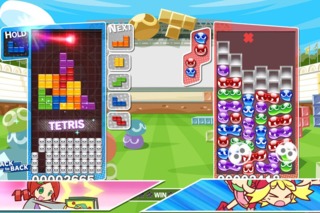
"Hey Colin, that's not Tetris Effect."
Yeah, but it'll probably be on 2019's list when I can get it without having to go, "Fuck, that's 40 bucks for Tetris", and that's before we get into the cost of doing the VR part that everyone's going wild for.
Blame the ol' budget.
In any case: Puyo Puyo Tetris is still really fucking good. Puyo Puyo is good. Tetris is good. Swapping back and forth between them is surprisingly satisfying, even if some of the other moods aren't all that engaging. There's this fantastic combative rhythm in Puyo Puyo Tetris that's a fair bit different from playing solo, getting you into an almost pleasurable sense of panic at times, because when you beat it by turning the tables around, you get an incredible sense of accomplishment and catharsis that goes with it. Being able to boot up a game on the quick at any time and play against CPU opponents that can really challenge me, even completely fucking destroy me, lets me get in some quick, satisfying gameplay while also pushing me to actually get better at it both games making up the source material. Like a lot of people, I'm primarily a Tetris guy, but the swap mode forces me to actually learn how Puyo Puyo works, how to build up chains instead of aiming just for a single group of puyos being cleared. There's this really intuitive sense to the game with the various difficulties that pushes you bit by bit to learn how to play better and better, on top of regular old tutorials.
Also: I'm kind of a sucker for just how ridiculous the story mode is, which hinges on the Tetris King being too depressed to keep two universes apart. Good times.
7. The Friends of Ringo Ishikawa
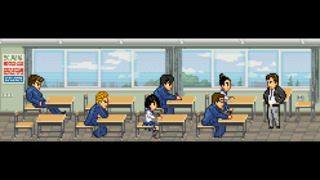
I'm a big fan of beat-'em-ups, and River City Ransom is one of my all time favorites. Many have tried to imitate it since, but few have truly hit the smooth balance it hit between that freedom to move around a city and fast paced brawling that let you tear you through gangs with a satisfying heft to each blow. The ideas to River City Ransom were ambitious, but it had them sanded down to a tight, focused game.
I'm also a big fan of what I've called "small town open world" games, where the idea of "going anywhere, doing anything" is focused down into something smaller, more localized, more focused. Like Shenmue and Deadly Premonition. I don't want to be able to go across an entire goddamn state as much as I want to be able to go into every store in the neighborhood, and chitchat with the people there. Being able to bounce into the knockoff 7-11 and make small talk with the cashier there, that's the thing that thrills me.
The Friends Of Ringo Ishikawa popped out of nowhere and asked, "How'd you like to do both?"
Where River City Ransom has you trying to rescue a kidnapped girl and Shenmue has you trying to learn more about the murder of your father, The Friends of Ringo Ishikawa plunks you down into the life of a Japanese high school delinquent and says "Alright, live this life however you feel like". It's definitely not going to be for everyone, but Ringo Ishikawa doesn't really tell you what to do, where to go, or even how to do it. Most of the information is there for you to be found on your own, and then decide on your own what to do with that information, if anything at all. The school has a regular schedule, with times you can look up of when classes and tests are happening, or when the after school clubs meet up. But... you don't have to do any of that. You can skip school almost every day. You can go pick fights and get knocked out and miss school entirely on accident. You can go hang out underneath the bridge, smoking with a bunch of other delinquents instead of going to school. You can stay inside and sleep all day instead of going to school. Where games like Persona might throw you onto a tight schedule with a plot that must be resolved, The Friends of Ringo Ishikawa, for the most part, says "It's up to you."
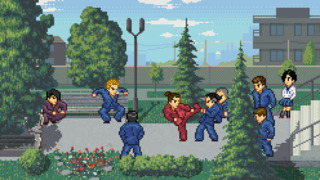
That's a key part of it, too. The plot, even at its most dramatic, is just the moment to moment existence of a high school asshole with bad grades who likes picking fights. You get challenged by other teen gangsters, but The Friends of Ringo Ishikawa knows this part of your life is not some incredible, world shattering thing. It is the days of your life in the last year of high school, and like so many years, they can be spent fucking around on shit that doesn't really matter, one way or another. For some it's memorizing answers to tests, for some it's getting into fights with other people for no reason but your own personal sense of pride. The Friends of Ringo Ishikawa is a slice-of-life beat 'em up, where you're not so much working to come to some grand resolution as you are just having moments, alone or with others. Living moment to moment, a quiet kind of existentialism, emphasized by a laid back soundtrack you'd never expect to find in a game where the primary way to express yourself is beating up other people.
I don't want to spoil the end, but it's also significant to say that there's only one ending. And that ending is a strength to the game, not a negative. Some other games try to make it so everything matters, or at least tell you that it all matters, but The Friends of Ringo Ishikawa is focused on those moments as they are, not some desperate effort to change where they lead to.
After all, you're not playing a hero changing the world. You're playing a high school jackass with too much pride and too much time on their hands.
6. A Mind Forever Voyaging
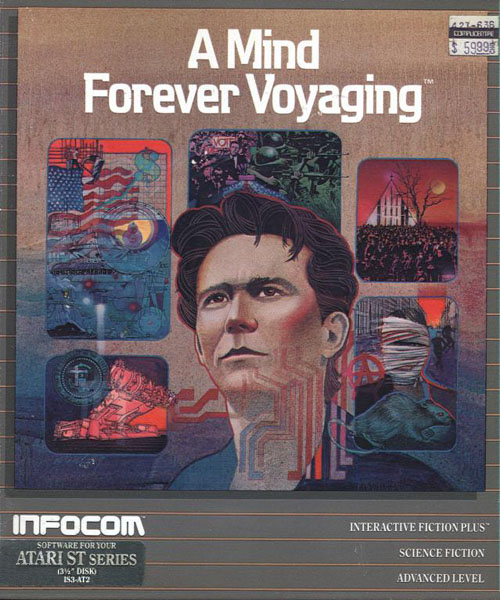
To make sense of where you are, you have to understand how you got there. Or, to put it another way, the only way to understand Now is to look at what was happening Then. After all, when you stub your toe, you don't imagine the pain got there out of nowhere, that nothing lead to your toe suddenly hurting and you swearing under your breath in your living room. Your foot had to run into something first. Nothing that happens now exists without precedent, without a history, that leads into the present.
Or, to put it yet another, blunter way, if you want to understand the nightmare that is 2018, you have to, at the very least, remember how much Reagan fucked shit up.
A 1985 Infocom text adventure sure isn't the kind of thing most people in games would be thinking about now, or indeed, any kind of people anywhere, ever. But this Steve Meretzky classic pops out to me as this curious, crucial time capsule, existing not only as a document of what people were feeling then in the time itself, but what they thought the future could be like, was going to be like, what they feared it was going to be like. The premise of A Mind Forever Voyaging is this: you are PRISM, the first sentient machine, and it is the year 2031. America and the world at large are in dire straits, with economic struggles rampant and nukes getting ever smaller and ever stronger, among a vast array of other problems keeping the world in disarray. A senator named Richard Ryder has proposed the "Plan for Renewed National Purpose" to try and right the course, with his ideas of how to accomplish it being, well, pretty much everything Reagan was all about. Mass de-regulation, huge boosts to the military (including bringing back the draft, which includes forced conscriptions of people convicted of crimes), cutting welfare of all kinds, and a focus on "traditional family values". Your job as the world's most advanced and only free thinking computer is to simultaneously run, exist in, and record a simulation on the effects of the plan--existing as a part of the simulation itself, instead of watching it from the outside, speaking to people and deciding what's important to record and report back to the man who created you, Dr. Abraham Perelman.
This is a game that's deeply, viciously critical of Ronald Reagan, so you can guess at how that Plan for Renewed National Purpose turns out. The details are probably worse than you're imagining, but the general outcome is clear as day.

Looking at a story predicting the future in the context of being from the future--33 years into the future, in our case--makes for, I imagine, a very different experience than when you're reading it when it comes out. "That's ridiculous!" and "It'd never happen!" is easy to toss out there. It's hard to wrap our heads around, truly, about how things actually get so bad, because generally the way things get awful is in a slow, granular fashion. You read a story predicting the future is gonna be awful, and it's too "sudden" to really see it as plausible. Skipping the banal boredom of how infrastructure erodes to make the terrible things possible in the first place. But A Mind Forever Voyaging catches that too. The world's already struggling miserably in 2031, but the simulation you run is in 10-year chunks. You see how the world is doing 10 years after the plan is enacted, and then 20 years, 30 years, 40 years, 50 years. You don't just skip to what you think is the worst case scenario of bad policy, you show the world getting to the worst case scenario, and that it takes long enough that people can get used to it, or lose the power to do anything about it. It's much easier to do something about awful things happening suddenly--it's much harder when that misery has crept in over years, decades, and made itself the new norm, a new figure of power, and just getting worse from there.
I could say some of A Mind Forever Voyaging is still over the top despite all that, but really, it feels impossible to say almost anything is over the top now. Things we would've called ham-handed and too on the nose 20 years ago look pathetic compared to the terrible and surreal things we deal with now.
Steve Meretzky's criticism of Reagan would fail to do anything to stem the tides of that power--as art in general lacks the power itself to do such a thing, no matter how much people talk up the power of art--but it's still crucial, valuable to have. To be able to play this old text adventure, to see 1985 in it, and to see what people in 1985 were afraid of--and how many of those fears came true.
5. Sunless Sea
Sunless Sea sets itself underneath the Earth itself, pulling in deeply from cosmic horror influences, surrounding you with a darkness on this giant body of water where hardly a speck of natural light exists, forcing you to burn precious fuel just to know where you're going--you can, of course, conserve that fuel, but that just makes it easier for panic and fear to set into your crew, as creatures and curses of the deep could be watching you at any minute. It sticks true to those ideas of being overwhelmed by forces beyond yourself you could never understand as you try to make your way across the sea, trying to stay alive, never mind thrive.
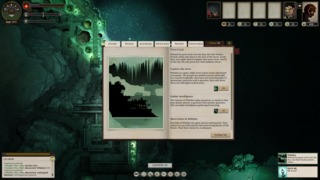
My favorite thing about Sunless Sea is that I find it very relaxing.
There are a lot of different ways to take in Sunless Sea, but when I settled into my own groove of the game, one of the things it reminded me of most was the Truck Simulator series. A lot of the game is about discovery, but just as much of the game is about delivery. You're taking and trading supplies from one port to another, taking information from those ports to take back home, and trading that information for free fuel that you use to get right back onto the sea once more, to try and discover something else while rolling through another shipping route. Just where American Truck Simulator would have me shipping several tons of lumber and plastic, Sunless Sea has me carting around crates full of human souls and the hearts of immense monsters. Sometimes while following my routes I have to kill giant crabs that are trying to kill me. But that's just part of the job, part of the routine, and it becomes just another part of that relaxing groove when I play Sunless Sea.
It takes so much of what I love about American and Euro Truck Simulator and throws in people with their own lives, their own drama, their own wars and conspiracies and curses placed on them by the gods of the sea, who'll pass the same curses onto you should you not show them enough respect. There's an island where thousands of lost packages and letters naturally drift to, and people dedicated to the postal service find themselves inexplicably drawn to. This island full of life and laughter, that you can talk to, that you can even work with, and feel the eerie atmosphere in the air of everyone's compulsion to sort those packages, as well as the unspoken of mysteries in the backroom of the postal office itself. I frequently yearn for the ability to get on foot in American Truck Simulator, to go into convenience stores and truck stops and talk to people along the way, and Sunless Sea gives me what I'm looking for there, just wrapped up inside of a world full of cosmic horrors and mysteries so thick they'll choke the air out of you. I may not be able to talk to the cashier behind the counter in a 7-11 in a Sunless Sea, but I can pay tribute to the king of the living dead in the sea by giving a story of what's happened to me on this boat I've been trying to keep afloat for weeks, months.
"Like a trucking simulator with a story mode, but set on a cursed ocean underneath the Earth's crust" may not have been the description Failbetter Games was looking for with Sunless Sea, but it's what makes the game a never-ending relaxing delight for me.
4. Invisible, Inc
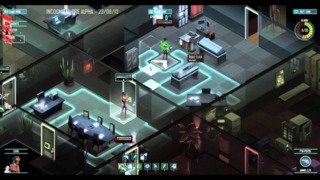
It's like I'm quantum leaping into Austin Walker circa 2016!
I finally got around to Invisible, Inc, and it just so... whole. It's so tight with its design, every piece fitting into each other like they were just always meant to be that way. The flow is incredible; everything, even making a mistake in the game, just feels so damn right. It's so easy to sink into the game, it's not even conscious. The ruleset of what's happening at any time feels almost impossible to lodge any complaint at, and even when the odds in a level come out hard and stacks everything against you, it just makes it all the more satisfying when you get a tight enough grip of the game's systems to pull out victory anyway. There's so much to Invisible, Inc that reminds me of the best ideas in board games. I feel like I could reach in and move the characters by hand, like little figurines to hack doors and steal documents, while an invisible hand on the other side of the table moves their pieces around to try and get the upper hand on me--both of us perfectly limited by the rules of what we can do, even when we can see everything about each other.
Invisible, Inc is fun, but it's more than just fun, it's so goddamn satisfying. Booting up a new mission never feels wrong--sometimes overwhelming, but never "wrong". I could go back to it right now and feel like I've never missed a step, and that the game would be just as strong when I finished it last time. I probably will after finishing writing this list.
If I was gonna lodge any complaint against it, it's that Decker's a wannabe noir nerd who probably practices Chinatown quips in front of a mirror every day, but the game itself dunks on him for it, so it's all good.
3. Killer7

Where Phantom Dust last year fulfilled the "because it got a re-release" category, Suda51's beautifully obtuse surreal adventure and sometimes first-person shooter classic Killer7 takes it this time. Killer7 is one of my favorite games of all time, so, I was naturally biased to it when it came back up, getting a new lease on life thanks to a PC port.
There's so much to say about Killer7. I've written thousands of words about it myself--most of them in conversations with other people who are also die hard Killer7 fans. Going over the story, the characters, the symbolism, digging through one bit after another, trying to see what they connected to in Killer7, what context it had in real life history, how much of it was reinforced and contradicted by the supplementary material "Hand In Killer7", if there was anything in Suda51's other games in the "Kill The Past" thematic series to connect it to... and having also spent many of those years only being able to assemble that last part of information from what other fans and sites were telling us, because we didn't get English releases of many of them until years later.
For me, probably the quickest way to summarize my affinity for Killer7 is where it exposes me as a hypocrite. I'm generally exhausted with what I call puzzle box analysis, where people look at media obsessing over every little detail they can find to try and suss out the "true meaning", or what have you. Tearing apart intentionally ambiguous games like Yume Nikki, looking for pieces of lore they can assemble into that true meaning, like an answer to the riddle of the Sphinx, and that everything has to connect together like an elaborate machine.
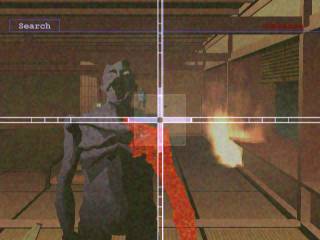
I'd like to think I don't do the exact same thing with Killer7, that I focus primarily on the themes it's working with, or the feelings it's trying to evoke, instead of looking for a "true meaning". I'd like to think that. But I can't deny that I still obsessed over the details, trying to understand. That I would--still do--go back to trying to connect the pieces in each part of the story which was so beautifully confusing, stories that felt impossible to understand and only made me want to understand them more. The times I'd do things like spend late nights talking to friends about Andrei Ulmeyda and what he represented as a thematic foil to Garcian Smith and delighting as we felt like we were unveiling parts of the game we never quite understood before, it was incredible.
It's such a strange, unique, bizarre game that's marked itself forever on my mind, not even just from the story, but from the experience of playing. Running through the hallways as a blind Chinese teenager, hearing the laughs of invisible walking bombs called "Heaven Smiles", exploding into a shower of blood so I could transform into a Mexican luchador with dual grenade launchers to blow them up before they could ever get close to me--it sticks with you.
With style for miles, a killer Masafumi Takada soundtrack that goofs on you by putting one of the best songs in a segment of the game that usually lasts 3 seconds at most, a surreal story that's simultaneously about post-WWII Japan and America relations and an endless cyclical war between a psychic collective of assassins and a man with a god hand that has powers that seem limitless, Killer7 remains one of my all time favorite games, and that holds true in 2018 too.
2. Heaven Will Be Mine
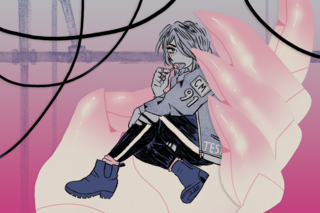
I'm really fascinated with games that function heavily around the internet--or, at least, feature the internet as some key mechanic. We've got plenty of more recent examples, like Analogue: A Hate Story or Killing Time At Lightspeed, but there's older stuff to pull from too. The never-released-stateside Serial Experiments Lain video game is one, or the surprisingly in-depth ingame internet of Front Mission 3, where you'd bounce around from website to website, read BBS boards, send and receive email, or even try to guess passwords to FTP into websites so you could download their files.
Heaven Will Be Mine grabs the internet of the modern era, the instant communication, multiple tabs open, sliding into DMs internet, and fuses it with the drama of battles between rivals on a long-running mech anime, and then fuses all that with queer romance drama, all of this within the last days alternate universe 1980s war, with a thick strain of meta-narrative DNA injected into it, creating a story where queer women in giant robots in space flirt with each other over psychic DMs while locked in a plastic kind of combat that never seems to present an actual physical threat (instead coming more as a physical performance of the feelings inside of them) all for a war that's not really over land or resources, but for the ability to redefine the existence of Earth and humanity and war itself.
Heaven Will Be Mine is a lot. It is a lot and I like it a lot. It's a lot to take in, it should be played repeatedly, it requires you to let go of a lot of standard ideas of storytelling and let yourself be absorbed into something that wants you to think more about what you feel instead of how you get from plot point A to plot point B, and it grabs all these intense, from the gut feelings, pumping them to you, the player, through both the form of dreamlike drifting internal monologues and typo-heavy instant messenger chats where a pilot is doing their best to intentionally push their best friend's buttons.
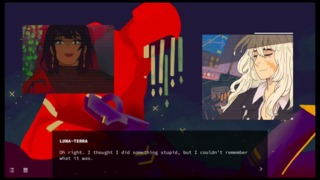
There's so much in Heaven Will Be Mine, it's hard to summarize, despite my best efforts--twice now--to do so. It pulls and pushes you, makes you jump through so many forms of communication, between people and also between a story and the reader themselves, that it's certainly not for everyone. It's not straightforward, and it doesn't stick to one kind of way to tell you what, actually, is going on, or what its themes are, or what the people inside this world are feeling and trying to get you to connect with those feelings. But I get more attached to HWBM because of this method, find myself more and more pulled into it. It captures a thing about the way we present ourselves to others, how we look at and talk about ourselves, how we refract ourselves into all sorts of different communication. The way we express ourselves is different in our phone calls, in our twitter posts, in our locked twitter posts, in text messages to others (flirty or otherwise), in essays we write, in stories we write, in our internal thoughts, in the conversations we have at dinner with family, in the conversations we have in the drive-thru line at Taco Bell with friends. Hell, here I am, writing far, far differently than I do almost every day. On my twitter, you'd never see me using this much proper capitalization and proper punctuation, and that's just for starters. I'm myself here, and I'm myself there, but how I express the self is different. It's not so jarring in our daily lives, but Heaven Will Be Mine throwing to you these different forms of expression can knock you on your ass when they're all wrapped together in a visual novel package--and you gotta let yourself melt into it and go along with the tides.
Heaven Will Be Mine still won't be for everyone, and it's hard to talk about how good the story is and how good the characters are without spoiling huge chunks of it, but it's still very damn good, and easily one of the best of 2018.
1. Hollow Knight
I'm a longtime sucker for metroidvanias. Have been since the genre was pretty much invented, my interest caused by PSM in the '90s shocking me by putting Castlevania: Symphony Of The Night over Final Fantasy VII as their game of the year and making me go, "I have to go try that". And I did, and I loved every minute of it, and I've bought re-releases of it too. And I got the GBA ones too, and I also got the DS ones, and I've played a wide array of metroidvanias since, varying wildly in quality, because I remain a sucker for the genre.
Hollow Knight, then, unsurprisingly captured me tight once I got my hands on it (a full year and change after release), bringing me into a taut game with this soft, moody atmosphere around its whole--a light melancholy on the edges of the air, either broken up by occasional flecks of laughter, or honed into the sharp tip of tragedy, striking for a moment before retreating back into that airy existence.
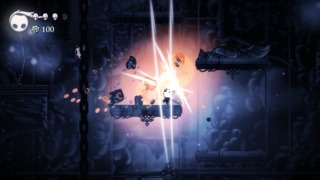
The gameplay itself is wonderful, not just for what it pulls so well from metroidvanias and from its other primary inspiration in the Dark Souls series, but what it does to differentiate itself from them. One fantastic example of it is the lack of leveling in Hollow Knight. Leveling seems to be in damn near every game nowadays, but no amount of killing monsters will boost your stats in Hollow Knight. You can get upgrades to your sword's damage output, you can collect items that boost your health and magic up to a certain point, but no amount of killing enemies, big or small, will reward you with a stat boost that will make killing those enemies any easier.
Hollow Knight draws more influence here from old action platformers, like the pre-Symphony of the Night Castlevania series itself, where it has a lot less to do with getting the best weapons or figuring out the best way to min-max your stats, and a hell of a lot more to do with simply learning how to use your weapon, how to move around effectively, memorizing enemies movements and attacks, and keeping aware of your environment. Even with the sword upgraded to maximum and successfully collecting every health and magic boost in the game, if you don't pay attention to what you, and your enemy, are doing, you're going to end up dead. Taking away leveling and almost all stats at all from the metroidvania creates a different experience, a far more challenging experience, and when you finally nail a boss that has been giving you hell for an hour, a far more satisfying experience. Aria of Sorrow is one of my favorite metroidvanias, but it's easy to admit that all the weapons and souls you collect, after a certain point, don't have so much influence on making combat interesting as they do on giving you fun novelties to play around with. By stripping everything down to a few key tools and no way to just grind your way to being strong enough to win automatically, Hollow Knight delivers a far tighter experience when the fights get heavy.
And the story, and the atmosphere again... there are some great playing metroidvanias out there that do nothing for me in keeping my interest with the characters, the story, or the world I'm moving around in. Hollow Knight is not some world-shattering revolution in storytelling, but that fantastic feel to it, that drapes over you with a light touch, that drifts over you like a soft fog instead of a hammer and a chisel scripting its words on a stone tablet, that keeps me close to the game while feeling like it isn't trying to do so at all. It's the little things, and the willingness to let them stay little things, that keeps you around. There's only so much you can learn, there's only so much people will say to you, so Hollow Knight gives you moments to gently drink in, which end up sticking closer to you than any long exposition heavy cutscene could. Talking to Cornifer, the excitable cartographer bug who's making maps of the world underneath the nigh-abandoned village of Dirtmouth, listening to him pleasantly go on about each place he's mapping out, his fascination with the comparisons and contrasts--it's this brief breath of the moment of a warm conversation with a stranger, the kind you'd get when you make a new friend while waiting in line somewhere. Or, one of my favorites, running into the swordsman Quirrel in the City Of Tears, and watching the rain pour onto a massive ornate window, observing it while sitting on an iron bench. It's not a long moment, not a long conversation with him at all, but it is the kind of moment that stays you with you for its mood, for its atmosphere. It's the small things that Hollow Knight focuses on, so it's the small thing that matters. Quirrel himself remarks on it--"Isn't this a wonderful spot for a rest? I so love the sound of the rain upon glass."
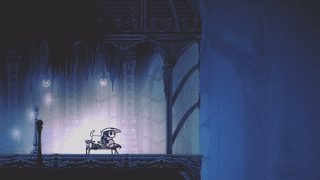
Not important, no. Not significant, no. But it truly is a wonderful spot for a rest, and the sound of rain on glass really is so nice.
Hollow Knight isn't breaking all-new ground. It's taking and refining and fusing together ideas from other games. Its story is an entertaining one, though it too is not something wholly new or revolutionary either.
It's those small moments and that lovely atmosphere, peppered into this taut, utterly satisfying game, that really make Hollow Knight what it is, and keep me thinking about it still. As the years go on, I'll almost certainly forget the details of the plot, the pieces of the lore to Hollow Knight--but I'll keep thinking about its moments, like sitting with a pleasant bug on a hard iron bench as the rain spatters against the glass.